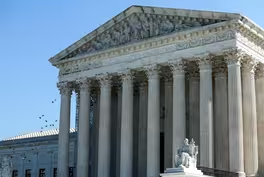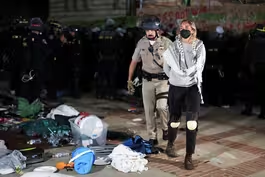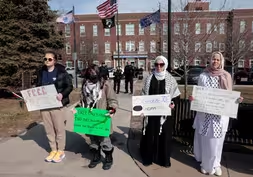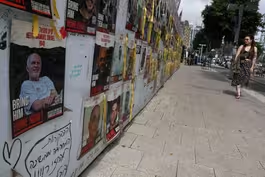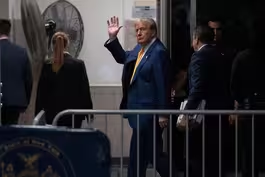
Book explores how ordinary people can be heroes of democracy
Clip: 5/2/2024 | 8m 31sVideo has Closed Captions
New book explores how ordinary Americans can be the heroes of democracy
Eddie Glaude Jr. has a call to action for everyday Americans to reclaim their political destinies from the heroes of our past and present. He argues it's needed to secure a just and democratic future for America and makes the case in his new book, “We Are the Leaders We Have Been Looking For." Glaude joined Amna Nawaz to discuss more.
Problems playing video? | Closed Captioning Feedback
Problems playing video? | Closed Captioning Feedback
Major corporate funding for the PBS News Hour is provided by BDO, BNSF, Consumer Cellular, American Cruise Lines, and Raymond James. Funding for the PBS NewsHour Weekend is provided by...

Book explores how ordinary people can be heroes of democracy
Clip: 5/2/2024 | 8m 31sVideo has Closed Captions
Eddie Glaude Jr. has a call to action for everyday Americans to reclaim their political destinies from the heroes of our past and present. He argues it's needed to secure a just and democratic future for America and makes the case in his new book, “We Are the Leaders We Have Been Looking For." Glaude joined Amna Nawaz to discuss more.
Problems playing video? | Closed Captioning Feedback
How to Watch PBS News Hour
PBS News Hour is available to stream on pbs.org and the free PBS App, available on iPhone, Apple TV, Android TV, Android smartphones, Amazon Fire TV, Amazon Fire Tablet, Roku, Samsung Smart TV, and Vizio.
Providing Support for PBS.org
Learn Moreabout PBS online sponsorshipOn our bookshelf tonight, a call to action for everyday Americans to reclaim their political destinies from the heroes of our past and present.
Princeton University professor Eddie Glaude Jr argues that is what's needed to secure a just and democratic future for America.
It's a case he makes in his new book, We Are the Heroes We've Been Looking For, and he joins us now.
Eddie, welcome back to the NewsHour.
Always good to see you.
It's always good to see you.
It's a delight.
So this is it's a beautiful book.
Let me say it.
Tackle some very big ideas.
But in reading it, it's also fair to say I think there's an urgency to your writing in this book.
Tell me about that.
What's driving that?
Well, I think, you know, we've outsourced our responsibility for democracy to law for too long.
We've outsourced it to politicians.
We've outsourced its so-called community leaders to so-called prophets and heroes, when in fact we need to take responsibility for it.
And if we don't take responsibility for democracy in this moment, and and we heard a lot of that in the last segment, if we don't do it in this moment, we may very well lose it.
So I'm saying that instead of thinking, you know, looking to an election, looking to politicians, we need to look to ourselves.
And in order to do that, we're going to have to really examine who we take ourselves to be.
We are the leaders we've been looking for.
You write in the book, we are the prophets.
We've been looking for this.
Is this an absolute call to action?
So what is it that you want to see everyday Americans do differently?
You know, I think there's a throughline, in the book throughout the book.
And it might sound a bit cliche, you know, and that is to say, if we're going to be the leaders that we've been looking for, we're going to have to be better people.
And if we're going to be better people, we need to we need to help make a more just and better world.
Because that world, the world as it's currently organized, values selfishness.
It values greed, it gives it gives license to hatred and grievance and fears.
Right.
So part of what we have to do is to do the hard work of becoming better people.
And I'm I get this from James Baldwin, Baldwin said, you know, and I'm paraphrasing in here that the messiness of the world is in part a reflection of the messiness of our interior lives.
We have to deal with our own wounds so that we can open ourselves up to the beauty and brilliance of other people, so that we can be committed to justice.
So I'm making the claim that reaching for higher forms of excellence is in pursuit of a more just world is a radical politics.
You write about, you call the heroes the prophets, the leaders of in particular, black, democratic with a small life, people like Baldwin, people like Doctor Martin Luther King Jr. And I guess I want to ask, isn't it sort of human nature to turn people into heroes and heroines, to aspire to some kind of ideals or something that undermines our democratic life with that?
You know, I think it's absolutely, you know, it ordinary makes sense that people will find, in the lives and witness of other folk examples, heroes, people that they look up to.
But the thing I'm worried about, and I think democracy should always be concerned about, is when prophets who are authorized by voices or authority outside of our form of life, or heroes who become larger than life, we end up giving ourselves over to them.
And the moment we start following people, giving ourselves over to them, we stop working on ourselves.
We stop doing the hard work of becoming better people.
Of course they're heroes.
But you know what?
Heroes are our examples.
You know, Ralph Waldo Emerson says, great people come to us for even greater people to follow.
We look to great people so that they can demonstrate the characteristic that we could if we choose, if we chose to demonstrate in our own lives.
You write about Ella Baker in particular.
It's sometimes referred to as the mother of the civil rights movement.
And you also refer to what you call her, quote, democratic perfectionism.
What does that mean?
Why is she an important person to highlight here?
She's such an important figure.
Without her, the 20th century black freedom movement wouldn't make sense.
In the 1940s, she was a field secretary for the NAACP.
She Helps You was the first executive director for the SClc, King's organization, Southern Christian Leadership Conference.
And there's a reason why those students who participated in the student sit ins in the 1960s, in 1960, organized themselves at Shaw University.
That was Miss Baker's alma mater.
She had this fundamental orientation that she wanted to expand who mattered in the demos.
So those black sharecroppers, those folks who followed in the cracks and crevices, you know, of our democracy.
She wanted to lift them up, but she also wanted to create a politics where they could understand their own power.
She says a strong people do not need strong leaders.
And so the objective is to create indigenous leadership.
Those of us who are working close to the ground in our communities must understand our own power.
And that's what organizing is all about.
Not to helicopter in, but to actually engage in the hard work on the ground of creating the conditions of building community, with others.
How do you reexamine some of your own views in this in some of your past essays and speeches as well?
So I have to ask, where does the election of America's first black president, the election of Barack Obama, fit into all of this?
You know, I, I cannot deny the symbolic significance of President Obama's election.
My son was rate, grew up with a black family in the white House.
And I can't begin to to, you know, give an account of how how meaningful that was for him and for me.
But I was annoyed that Obama's presidency was seen and often interpreted as the eventual in the outcome of of the civil rights movement, that this was what the black freedom struggle aspired to do, and that is to put a black man in the white House.
It was the quest for justice goes beyond elections.
It goes beyond just mere representation.
So I look back with some with some trepidation.
How did Obama's presidency narrow what is considered legitimate forms of black dissent?
How did it constrain black politics?
I'm trying to open that up in my own individual way in this book.
You talk about the search and the effort to become a better person.
You turned that lens on yourself as well.
And there are some intensely personal parts of this book, one in which you write about what you call your own primordial wound when caused by your father.
That moment really stuck with me, and I just wonder why you felt compelled to include that in the book.
You know, oftentimes we hide our vulnerabilities.
You know, the idea of being a leader is that, you know, you don't you don't show that you, your broken team, Doctor King wouldn't smoke in public.
You know, we don't know the biographies of of Reverend Jesse Jackson or we know only glimpses of Sharpton, right, of Reverend Sharpton.
What I wanted to do was to to kind of deal with my own wounds.
You know, to understand how brokenness shapes me, shapes my own voice.
And and my father sits at the heart of that.
I love my father.
We have the one a wonderful relationship today, but that's a journey.
You know, he scared the living daylights out of me as a kid.
He could just look at me and I would cry at times.
And so, by virtue of my fear, the fear that he deposited in my gut, I thought I was a coward.
And so I reached for my heroes.
I reached for Malcolm X. I needed a form of masculinity in the face of.
Of what felt like, being emasculated daily in some ways.
But, you know, you you understand the beauty and brokenness.
We're not reaching for wholeness.
We have to understand the goal that that fills the cracks.
And that's what I'm trying to do in that chapter.
Yeah, there's a message of hope.
And you say that yours is an abiding faith in the capacity of everyday, ordinary people to be otherwise and in our ability, no matter the evils that threaten to overwhelm, to fight for a more just world.
In the minute or so I have left.
Eddie.
Where where do you derive that faith?
And human beings in us.
I come out of a tradition where it didn't seem possible for us to imagine ourselves in the grandest of terms.
We were nothing but slaves, according to some.
But oh my God, did we make life swing Duke Ellington style.
We gave the world the blues.
We gave space and time.
Our rhythm in so many ways.
So the, you know, human beings can be disastrous and cruel.
But you know what?
We can also be miracles.
And my God, do we need miracles today?
That's Professor Eddie Glaude junior, author of the new book, We Are the Heroes We have been looking For.
Eddie, always a pleasure.
Thank you.
Thank you so much, I appreciate you.
Analyzing the consequential Supreme Court term
Video has Closed Captions
Clip: 5/2/2024 | 7m 57s | Analyzing the consequential Supreme Court term and its ideological divide (7m 57s)
Biden condemns violence as some college protests escalate
Video has Closed Captions
Clip: 5/2/2024 | 9m 7s | Biden condemns violence and disorder as some college protests escalate into confrontations (9m 7s)
How young Michigan voters feel about the upcoming election
Video has Closed Captions
Clip: 5/2/2024 | 9m 48s | How young Michigan voters feel about Biden, Trump and the upcoming election (9m 48s)
Niece of American held in Gaza on efforts to bring him home
Video has Closed Captions
Clip: 5/2/2024 | 6m 39s | Niece of American held hostage in Gaza for 8 months updates efforts to bring him home (6m 39s)
Testimony in Trump trial continues after gag order hearing
Video has Closed Captions
Clip: 5/2/2024 | 4m 8s | Testimony in Trump hush money trial continues after 2nd gag order hearing (4m 8s)
Providing Support for PBS.org
Learn Moreabout PBS online sponsorship
- News and Public Affairs

FRONTLINE is investigative journalism that questions, explains and changes our world.

- News and Public Affairs

Amanpour and Company features conversations with leaders and decision makers.












Support for PBS provided by:
Major corporate funding for the PBS News Hour is provided by BDO, BNSF, Consumer Cellular, American Cruise Lines, and Raymond James. Funding for the PBS NewsHour Weekend is provided by...
